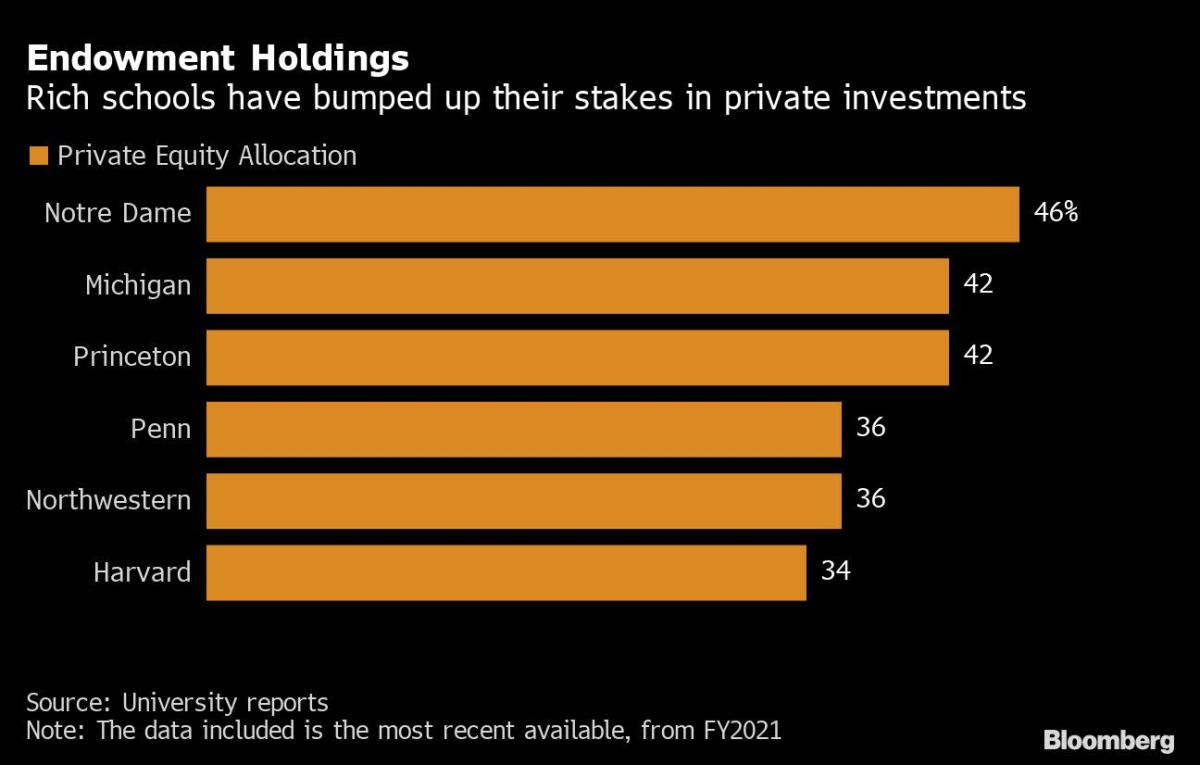
(Bloomberg) — Princeton, Harvard and Yale generated robust returns for their endowments in recent years, fueled in part by billions of dollars of investments in private equity and venture capital.
That golden era appears to be over, at least for now.
College endowments across the US are likely to report losses for the fiscal year ended June 30 as valuations for startups and other closely held companies deflate, following a sharp decline in public markets and the end of cheap leverage.
“The magnitude of the drawdown in venture companies and public markets is so much greater than it has been going back to the financial crisis,” said Jay Ripley, co-head of investments at Global Endowment Management, which runs $12 billion for colleges and foundations.
Rising rates and recession risks are threatening startup valuations. The consequences will ripple across private equity, where firms such as Blackstone Inc. made big bets on fast-growing companies in recent years. Markdowns have already bruised other money managers, contributing to record losses at the hedge funds of Tiger Global Management and D1 Capital Partners.
Many are being hit both by writedowns on venture holdings as well as losses on publicly traded stocks. Earlier this year, Coatue Management side-pocketed some assets rather than unload them at depressed prices. The California Public Employees’ Retirement System recently sold about $6 billion of privates at a 10% discount.
The richest US colleges have the most exposure. Those with endowments of more than $1 billion had about 30% of their holdings in private equity and venture capital as of fiscal 2021, according to TIAA and the National Association of College & University Business Officers.
When colleges report financial results for the year ended June 30, “you’re going to see a large proportion of endowments over-allocated to private equity,” said Karen Rode, head of private equity and infrastructure research at Aon Plc, which helps endowments invest capital.
It’s a stark reversal from fiscal 2021, when endowments generated fat returns and the richest schools faced pressure to increase spending on faculty, facilities and financial aid. But the pandemic dealt a sharp financial blow, crimping revenue from tuition, room and board as students sat out or studied remotely. Now, surging inflation is eroding colleges’ spending power and the stock market decline may further constrain parents’ budgets.
Princeton’s Portfolio
Princeton, with a $37.7 billion endowment led by Andrew Golden, has steadily boosted its allocation to private equity. Such investments accounted for 42% of the portfolio — 12 percentage points above target — as of June 2021.
The rationale for the increase?
“Spectacular performance,” the managers said in the endowment’s annual report. Indeed, private equity was Princeton’s best-performing asset for the period, returning 99%.
At Harvard, the richest US college with a fund valued at about $53.2 billion, the portion of the portfolio dedicated to private equity has more than doubled in the three years through June 2021 to 34%, under endowment chief N.P. “Narv” Narvekar.
Yale University’s private equity and venture holdings accounted for 38% of the endowment as of June 2020, compared with 31% in mid-2016. The fund, led by Chief Investment Officer Matt Mendelsohn, declined to provide 2021 data.
Representatives for the schools declined to comment.
While private colleges aren’t required to disclose their holdings, public records show that state schools put money to work with some of the biggest hedge funds, venture capital and private equity firms.
The University of California’s endowment has invested with Sequoia Capital and Blackstone. The University of Michigan is a client of Bridgewater Associates and Farallon Capital Management. The University of Texas Management Co. invests with Fortress.
Rising recession risks and lackluster returns could alter the spending outlook for colleges after a period in which the strongest returns since the 1980s allowed them to add money for initiatives including financial aid and staff benefits. Endowment leaders, however, say budgets are based on multi-year averages, not one-year returns.
What Bloomberg Intelligence Says:
“Private equity’s oft-discussed outperformance is limited to the best months of equity markets and doesn’t come to the rescue in the worst down markets.”
–Gaurav Patankar, BI senior strategist.
Many private equity managers have big incentives to hold off on marking down the value of their investments, allowing them to maintain healthy returns while hoping for the market turmoil to end. That’s likely to set up a clash between investment firms and endowments.
“Private equity will slowly get written down if the market doesn’t rebound quickly,” said Philip Zecher, CIO of Michigan State University’s $3.9 billion endowment. As of the middle of last year, 40% of the school’s portfolio was allocated to private investments.
This year, Blackstone executives told investors in a crossover fund, which bets on both public and private firms, that they would wait until private company valuations reset before they get comfortable investing more of the fund there.
Some endowments are pushing investors to devalue their assets as soon as possible to avoid the prospect of protracted writedowns. Scott Wilson, CIO of Washington University in St. Louis, is among them. The school’s fund returned 65% last year.
“We’re encouraging our partners to be aggressive in writedowns,” said Wilson, who manages $15.3 billion. “I’d rather have the marks reflect reality.”
©2022 Bloomberg L.P.